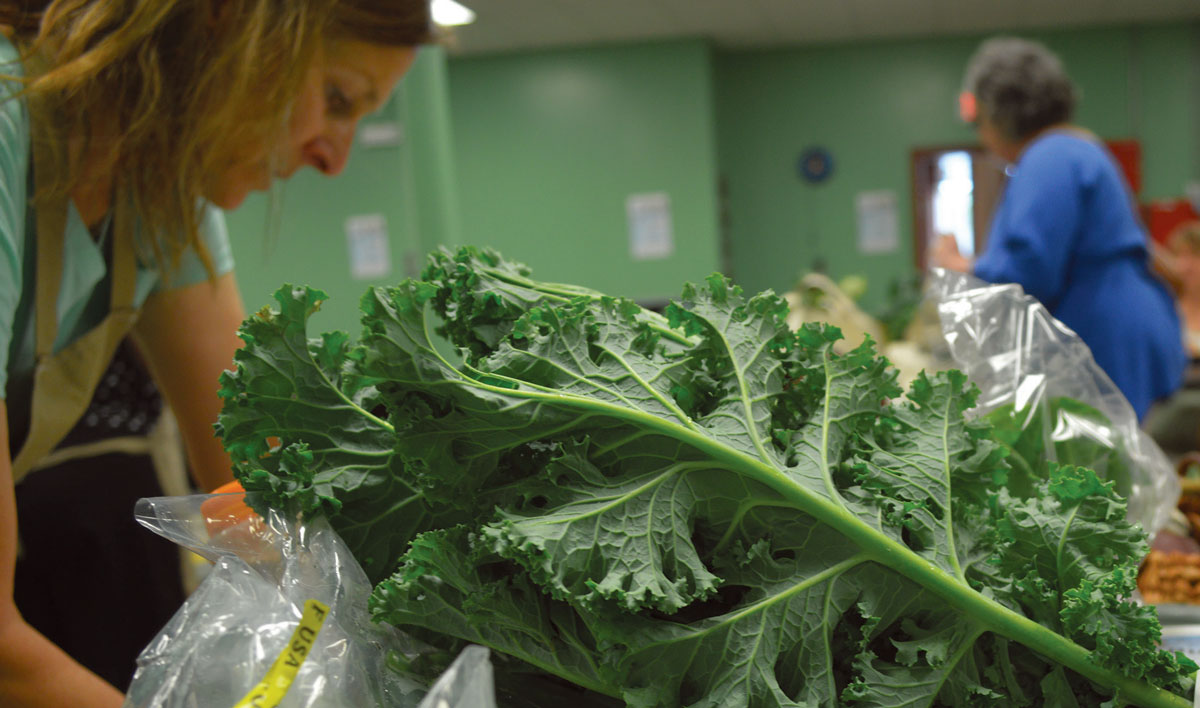Buy Iowa
Regional Food Co-ops Take Off in Cedar Rapids & Des Moines
Kim Burnett-Hanssen is passionate about local foods, but can do without the chaos sometimes found at large farmers markets.
“I work nights and I’m not a big crowd person,” said Burnett-Hanssen, a communications specialist at Iowa Methodist Medical Center in Des Moines.
When she heard about the Iowa Food Cooperative, Burnett-Hanssen found the perfect solution to fill her appetite for fresh produce and more.
The Des Moines-based cooperative, along with the Iowa Valley Food Co-op, centered in Cedar Rapids, are two of just 20 or so food cooperatives nationwide that operate as “virtual farmers markets,” using modern technology to connect customers to old-fashioned, farm-fresh foods.
Members peruse the online list of a wide variety of items available from area farmers, bakers and producers, ordering what they like at their own convenience. Those growers and other producers, in turn, prepare the orders to drop off at a central distribution site where the items are picked up by members on designated days.
“We don’t do a lot of shopping at the grocery store anymore,” Burnett-Hanssen said, citing eggs, honey, hand-made pasta and more that she buys through the co-op. “To me, it’s a great way of investing in the community. Everything is Iowa-grown or Iowa-made and the money stays here.”
The co-ops don’t have a retail store, but operate as facilitators to connect consumers and producers in the web-based marketplace. That can be confusing, at times, for visitors who try to find the co-op’s store as they travel through Des Moines, said Gary Huber, general manager of the Iowa Food Cooperative.
“It’s a different way to buy food for your family,” said Huber, who is also one of the co-op’s growers. “We’re one of the direct-to-consumer options.”
Dark green kale, colorful Swiss chard, red-ripe berries, pasture-fed beef, pork, lamb, chicken, chevron, tantalizing baked goods, homemade soaps, rugs and more can be ordered at the click of a button.
To shop or sell, consumers and producers pay a fee to become members, with a small charge added to sales for operational expenses.
Huber said members cite community vitality, social responsibility and economic resilience among their reasons for joining. They also share a level of trust in the quality of the co-op’s products and like knowing where their food comes from and offering a fair price to local farmers.
“I think the future for small farmers is to have a robust economy around local foods,” Huber said. “(The co-op) is not the only answer, but it’s one of the viable answers.”
Launched in 2008, the Iowa Food Cooperative was patterned after the successful Oklahoma Food Cooperative.
The Oklahoma City-based co-op, which touts fresh peanut butter, 30-pound watermelons and hickory-smoked Caciocavera cheese among the 5,000 products offered on its website, was the first local cooperative of its kind in the nation and has sold more than $5.7 million in local foods and non-food items to date. All products are grown or made in Oklahoma.
Huber noted that the Iowa Food Cooperative continues to grow, with nearly 1,000 members and distribution sites in six locations: two in Des Moines, including a new central location at 4944 Franklin Ave., as well as West Des Moines, Osceola, Ankeny and Ames.
Jason Grimm, co-founder and coordinator of the Iowa Valley Food Co-op, wanted something similar for Eastern Iowa. The Cedar Rapids-based co-op began in 2011 and has since grown to more than 450 members.
With a new location at 201 Third Ave. SW, in the up-and-coming Kingston Village area of Cedar Rapids, Grimm said the co-op would like to add distribution sites, such as Iowa City and Marion; but that would require more volunteers.
Iowa Valley Food Co-op added a second monthly pick-up day in the summer, when growers offer an abundance of fresh produce, but even in the winter, items like locally grown apples, potatoes and greenhouse vegetables can be found through the cooperative, along with non-seasonal items, such as dairy products.
A growing number of Iowa farmers and gardeners also use hoophouses: plastic-covered structures that extend the growing season for greens and other vegetables that are sold through the co-ops.
Grimm noted that the co-op’s produce is generally fresher than what can be purchased in grocery stores or even at many farmers markets.
“I harvested stuff this morning,” Grimm, who is also a producer member of the co-op, said on a distribution day this summer. Kale, leeks and beans are among the items grown by Grimm Family Farm.
Marcus Johnson, an Iowa Valley Food Co-op board member, said the co-op can be more convenient than spending hours at a farmers market and not knowing what might sell. Co-op producers only post what they have available online and only bring what has sold to distribution days.
Johnson is co-owner of Buffalo Ridge Orchard, which grows more than 5 acres of vegetables and over 3,000 apple and pear trees near Central City. He and his wife, Emma Johnson, along with Emma’s parents, Mary and Vern Zahradnik, still sell at farmers markets, but have become more diversified through connections made through the co-op, including sales to colleges and grocery stores, he said.
As popular as the fresh produce is, meat is the co-op’s top seller. Producers share their farms’ management techniques on both co-ops’ websites, including what the animals are fed. Shanen Ebersole, vice president of producers on the Iowa Food Cooperative board, said calves are born and raised their entire lives at Ebersole Cattle Co., near Mount Ayr in southwestern Iowa.
Ebersole also points out that the ranch is Animal Welfare Approved, meeting the highest welfare standards in the nation. No hormones or antibiotics are used on Ebersole’s purebred Maine-Anjou cattle. The ranch raises both 100 percent grass-fed beef and pastured beef and uses no pesticides or chemicals on its pastures.
Co-op customers tend to care about how animals are treated, Ebersole noted, adding that besides being a producer member of both Iowa co-ops, she is also a customer. Ebersole appreciates knowing, for example, that her favorite pie maker bakes a low-sugar black raspberry pie. She also enjoys the convenience of the co-op.
“I love the fact that the consumer basically has an online farmers market at their fingertips,” Ebersole said. “It’s a direct link to the farmer, but with the ease of an online grocery store.”
Iowa Valley Food Co-op: IowaValleyFood.org Iowa Food Cooperative: IowaFood.coop
Cindy Hadish writes about local foods, farmers markets and the environment at: HomegrownIowan.com





